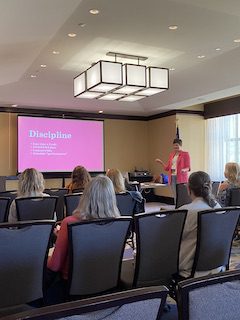
Lillie Gardner has discipline, as both a writer and a musician. She holds a PhD in piano performance and is a piano instructor. And she meshes the discipline of music into the discipline of her writing.
At HippoCamp22, in the session titled “Write Like a Musician,” Dr. Gardner stated that creative nonfiction and music are both TMI: temporal, manipulative (in affect), and interpretive. She played the same passage of three performances of Bach’s Fugue No. 4 in C-sharp minor, showing the artists’ different explorations of meaning. As an exercise, she suggested we write then see if we can come up with ten ways of viewing what we’ve written. Life experiences are like a musical score: honored as sacred truth but not us—since we are characters in our writing—and interpreted for the audience.
Musicians and writers both employ phrasing to create the moving-forward horizontal experience. They pay attention to dynamics, rhythm, and repetition. To show these connections, Gardner compared a section of Florence Price’s Piano Sonata in E Minor, II. Andante with Terese Marie Mailhot’s Heart Berries. One finds balance in both music and writing, that is, the vertical experience with layered dynamics, harmonies, and hierarchies—and repetitions of musical phrases and words, as in Fanny Mendelssohn Hensel’s Melodie Op. 4, No. 2 and again, Heart Berries. Phrasing and balance work together in arrival points: driving momentum, giving purpose, focusing the experience, providing structure and memorable moments. Gardner compared excerpts from Beethoven’s Symphony No. 7 in A Major, II. Allegretto and Cheryl Strayed’s Wild.
Moving from discipline meaning subject to discipline meaning exercise, Dr. Gardner noted the lost time times two rule: time taken off equals the number of days times two to get back. When she was a piano student, she followed the 9-9-6-9-9-6-0 plan, that is, the number of practice hours for Monday, Tuesday, Wednesday, Thursday, Friday, Saturday, and Sunday, respecting the day off. For busy adults, Gardner said that five minutes per day is better than zero, and she encouraged us to schedule “performances” for our work, that is, to share it.
Dr. Gardner’s final advice: Practice. Start with a warm up, treat your body like your instrument, and tackle the toughest or newest stuff first. As pianist José Ramón Mendez says, “Deliberate effort will result in progress.” And as Lillie Gardner said, “Everything is practice.”
Now that I have warmed up my writing, time for me to warm up my flute.



Hi Carole, this session seems perfect for someone like you, both writer and musician! I wonder if you have your own take on how writing and music principles/training/performing relate to each other.
Hi Shirley – Good question!
Music is foremost in my mind when I write, perhaps because I sang before I talked. While writing, I “listen” to the words, the phrasing, balance, and beats. The same happens with public speaking, teaching, and reading my work or Scripture. It’s not synesthesia, but clearly the disciplines are related for me, as is the intense discipline.
Thank you for helping me think!
-C.D.
Carole, I enjoyed this discussion. While I haven’t played a musical instrument for many years, I can see the connections between music and writing.
Lilie Gardner’s session was wonderful. I’d never thought about the connections but can “hear” them when I’m writing. And when I read your poetry.